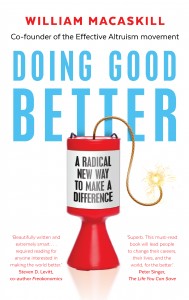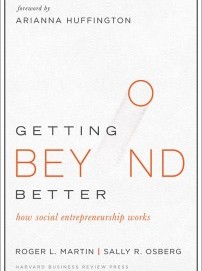Review by Lidwien Sol and Kellie Liket
Social media has us ‘doing good’ in increasingly visible ways, from ice buckets to Zuckerberg’s letter to his daughter. However, tackling global challenges – as individuals but also through professional philanthropic foundations – is a serious task that we do not always get right. William MacAskill, in his sharply written book Doing Good Better, focuses on addressing the complexities of doing good. His book is the latest from the effective altruism movement – an association of academics and practitioners who use utilitarian principles to maximize the good their donations do.
MacAskill is an associate professor in philosophy at Lincoln College, Oxford. He is a prime example of a young academic who hasn’t lost touch with reality and knows how to convey his passionate message to the general public. He has co-founded two non-profits, givingwhatwecan.org and 80000hours.org. Where the first organization encourages people to take a pledge to donate 10 per cent of their future income to effective charities, the latter provides advice on how to make a difference with your career. 
MacAskill starts out by showing that we all have the power to improve hundreds of lives. As members of developed economies, our money can do a hundred times as much to benefit the poorest of the poor as it can to benefit ourselves. As MacAskill states, ‘It’s like a happy hour where you could either buy yourself a beer for five dollars or buy someone else a beer for 5 cents.’ For example, by donating the amount of the annual subscription fee for this magazine, you could help deworm 37 school children and protect 12 people from malaria for up to four years (both the relevant charities feature among GiveWell’s four top charities).
So what’s stopping us from doing good better? In choosing meaningful careers or charities to donate to or even buying Fairtrade chocolate bars, we often base our decision on emotions and good intentions rather than existing evidence. MacAskill’s book is full of counterintuitive insights, to show us the shortcomings of emotion-based charitable behaviour. For example, he debunks the idea that a lot of good can be done by working for an NGO. It might instead be more effective to become a well-paid consultant and donate your money to charity, paying the salaries of five NGO employees. While this way of applying data and rationality to calculate ‘the most bang for your buck’ might seem far-fetched and cold-hearted to some, MacAskill finds a way to convey his message in a convincing and upbeat manner.
In a way, the book paints a somewhat simplistic view where our capitalistic world is taken as a status quo. MacAskill doesn’t dwell too much on the causes and dynamics underlying the challenges our world is facing today. This falls in line with the effective altruists’ approach. Rather than trying to change the drivers of power in today’s world, effective altruists attempt to achieve as much positive impact as possible within the limits of the system. Another challenging concept of effective altruism is that it separates our donations from the way we earn the money and the lives we live. That is effective altruism at its core: it does not ask us to donate all our money to charity, it simply asks us to reflect on our donating behaviour and redirect donations towards effective charities and causes.
Doing Good Better is much more than just a guidance book for over-privileged recent graduates. It touches upon every aspect of our lives – career, donations and volunteering – and is a must-read for anyone wanting to do good. For drifters, for do-gooders, for corporate bankers or retirees – this book will have everyone turning its pages and leaves you feeling empowered.
Lidwien Sol is a PhD candidate in philanthropy and sustainable finance at Maastricht University. Email l.sol@maastrichtuniversity.nl
Kellie Liket is a post doctoral researcher at Erasmus University Rotterdam. Email kellieliket@gmail.com
About the book
Published by Verso
Price
$26.95
ISBN
9781592409105
To order
http://www.versobooks.com







Comments (0)